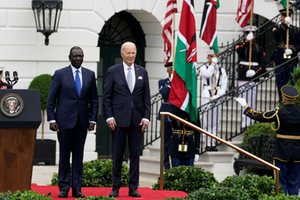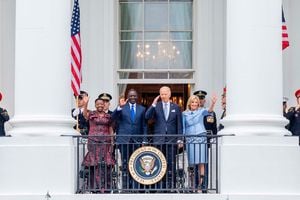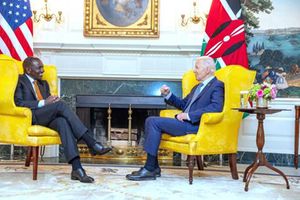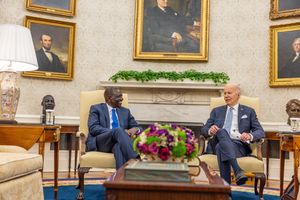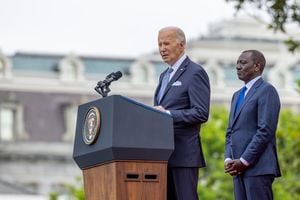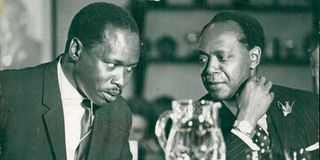
Daniel arap Moi (left) and Charles Mugane Njonjo.
It was September 18, 1979, a year after Jomo Kenyatta’s death. The meeting in London between Attorney-General Charles Njonjo and the British Foreign and Commonwealth Secretary Lord Carlington touched on Mwai Kibaki, the new vice president, and his political ambitions. Call it backbiting.
The minutes of this meeting, hitherto unreported and available at the British archives, show that Njonjo, who was on a private visit, told Lord Carlington that Kibaki had “turned against Moi” and himself and that he was perhaps ungrateful “despite their conciliatory act in seeing that he got the job of Vice-President”.
That was curious, though not surprising, coming from Njonjo, who had formed the triumvirate with Kibaki and Moi that had defeated the Kiambu ‘mafia’ on the Kenyatta succession.
Why was Njonjo angry? I have heard from different quarters that Kibaki and Njonjo fell apart after the latter went to Kibaki’s Muthaiga house to inform him that he would be Moi’s Vice President.
It seems that Kibaki did not take that kindly, for Njonjo had behaved like the appointing authority that evening.
Thus, this Kibaki ambition debate in London occurred within that context and before the first post-Kenyatta General Election set for November 8, 1979. According to a briefing in the Njonjo and Kibaki file at the Kew Garden archives, the British seemed to have faith in Njonjo and was said to be “very closely involved in advising the President on his tactics during the elections”.
The word “tactics” was slightly loaded in Kenya's election parlance. It could mean fraudulent means or rigging.
Moderately put, it would have meant removing some of the influential figures in the past Jomo Kenyatta presidency who had opposed Moi's rise.
On the same note, it was pointed out that President Moi's position was not in any danger, “but he has a problem in deciding to what extent he should intervene to support candidates of his choosing”.
During the meetings with Njonjo, which were several and with different people, the British wanted to “sound out Mr Njonjo on the influence those opposed to the President (eg, leading Kikuyu families) can be expected to have on the Election”.
At this point, Kibaki became a point of discussion, as well as his ambitions to become President.
Njonjo told London that the move to “push Kibaki forward had to be taken seriously”, which may have meant that Kibaki was interested in running against President Moi or that some quarters were working towards that. In essence, Njonjo alluded to the fact that only he and Moi could guarantee the British interests in Kenya.
What is known is that, in the 1979 general election, Moi pruned Parliament of most of the politicians who supported the 1977 change-the-constitution move that sought to bar him from ascending to the presidency. Cabinet ministers who lost their seats included Mbiyu Koinange, Dr Julius Gikonyo Kiano, Jackson Angaine, Nathan Munoko, Daniel Mutinda, James Osogo, and Mathews Ogutu.
Dr Waiyaki survived the elections, much to Mr Njonjo’s chagrin. According to the minutes, and as per Njonjo, Kibaki’s ambition “was also likely to be supported in the short term by Dr (Munyua) Waiyaki”, Minister for Foreign Affairs before the elections.
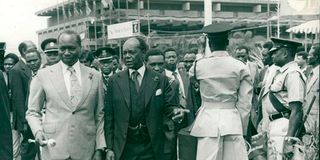
President Daniel Moi with then Attorney-General Charles Njonjo at a Safari Rally event. Njonjo, as AG and Minister for Home and Constitutional Affairs, used police to get even.
“Njonjo said that, with the help of funds from Libya and Iraq, Dr Waiyaki had the support of a group of 40 MPs,” the minutes read. That is interesting given that later on, when he became President, Kibaki courted the Libyans, reopened the Embassy in Nairobi and made a State visit to Tripoli in 2007.
However, Dr Waiyaki had a beef with Njonjo, dating back to the Kenyatta days when the two held different views on South Africa. While Njonjo badmouthed Kibaki by citing links with Libyans and Iraqis, Dr Waiyaki also told the Americans that Njonjo had “excessive influence” on Moi and should be removed.
What was interesting was that Njonjo had gone to the UK to discuss the printing of ballot papers with Bradbury & Wilkinson — the company that had been contracted to print Kenyan currency since 1966. One of the minutes suggests that he was “Moi’s business partner” without elaborating.
So it seems that Njonjo had cultivated commercial links with Moi to survive and strategically as a valuable British ally in Rhodesia.
When the Waiyaki matter reached the East African Department in London, an official, J.A. Ronson, wrote to the High Commissioner in Nairobi, Sir Stanley Fingland, saying Dr Waiyaki had told a US State Department official that “there was dissatisfaction and irritation amongst some Kenyan politicians about Njonjo’s influence with President Moi, which they regarded as excessive”.

Left: Attorney General Charles Njonjo (third left) opens the 1980 Marlboro Safari Rally Week desk at the Inter-Continental Hotel, Nairobi. Looking on are Bharat Bhardwaj (left), Chairman of the rally, Alice Muya of the Inter-Continental Hotel and Eric Cecil.
Sir Fingland was told that the US Embassy official had reported that “Kenyan politicians most dissatisfied were considering whether it might not be necessary to dump Moi on the ground that he would never escape from Njonjo's shadow”. If Moi had been dumped at that stage, Mr Kibaki would have benefited.
In his reply, in a letter dated February 15, 1979, Sir Stanley Fingland told J.A. Robson of the East African Department that he had checked with the US Embassy and “it was not the view of the Embassy as a whole that there was any significant body of opinion in Kenya which considered that it might be desirable to dispense with Moi on account of Njonjo’s excessive influence”.
He went on: “Although (US Deputy Chief of Mission) did not admit it, we do know that the head of the Embassy's political section holds the personal view that Njonjo is a liability to Moi, and it would be better for Moi if he were to rid himself of the Attorney-General.” That was an exciting view five years before Moi liberated himself from Njonjo.
According to Sir Fingland, Dr Waiyaki was responsible for the Kenyan political views. According to the High Commissioner's letter, Dr Waiyaki had generally suggested that “may be it could even come to the general interest of the nation to have another president than Moi in view of Njonjo’s pervasive personal influence over him”.
It is interesting to note that internal wrangles started after Moi took power in August 1978. According to another post-election background brief, prepared on December 13, 1979, by the East African Department of the Foreign and Commonwealth Office, “Njonjo may be thinking of taking the position of Prime Minister fairly soon”.
While this is not mentioned, the creation of the powerful Chief Secretary post, which went to Njonjo’s ally, Jeremiah Kiereini, could have been part of Njonjo’s strategy.
Another biographical brief prepared for the Secretary of State, dated September 17, 1979, hints at Njonjo’s powers: “Since President Kenyatta’s death, he has attained increased influence, and many see him as the power behind the throne.
This has caused resentment among some of his fellow Kikuyu who regard him as having ‘betrayed’ his tribe’s interests… his mode of dress and opinions have led him to be known as more English than the English.”
Something else that shows Njonjo’s power was that in the December that followed the November elections, Njonjo asked Chief Justice Sir James Wicks to request the British High Commission for British judges to handle the post-Kenyatta election petitions.
The reasoning was a bit weird and racist: “Petitions were always a potential cause of unrest if they were not seen to be properly handled and they had to be heard by three judges, none of whom could be African, as experience had shown.”
So, Njonjo was out shopping for judges to handle election petitions and Britain was willing to help.
During a subsequent visit, Mr Njonjo insisted on meeting Secretary of State Lord Carlington, and the East African Department advised that they had to agree:
“As you know, Mr Njonjo is not easily put off and will press to see Lord Carlington personally.”

After Charles Njonjo (right) helped President Moi (left) fight off would-be opposition, it was time for Moi to deal with Njonjo. PHOTO | FILE | NATION MEDIA GROUP
Another confidential note written on December 6, 1979, from Nairobi to the East African Department illustrates why Njonjo was important: “I hope that a meeting with Lord Carlington will be possible, particularly in view of the strong support which we have received throughout from Mr Njonjo for our Rhodesia policy.
(Again) "Njonjo has a high personal regard for Lord Carlington, to whom he always refers by Christian name.”
A.J. Longrigg, in a restricted note to Lord Carlington's Private Secretary dated December 14, 1979, said, “It is possible Mr Njonjo will raise this with the Secretary of State this afternoon. And I have therefore spoken with the ODA, who say they should be able to help.”
The Chief Justice had asked the High Commissioner to approve the continued services of Justice Norbury Dugdale, whose contract had expired. Dugdale would be a pro-Moi supporter within the judiciary. Some of his rulings include a declaration that the Bill of Rights in the Constitution was “unenforceable”.
The other was the throwing out of Prof Wangari Maathai's case against Kanu on constructing a 60-storey building within Uhuru Park in 1989.
Justice Dugdale argued that Prof Maathai had no “locus standi” to file the case. The dynamics that followed the Kenyatta succession and — the short-term friendship speak more about Kenyan politics.

